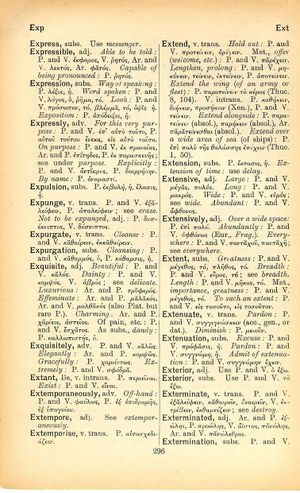exterior: Difference between revisions
From LSJ
κάμψαι διαύλου θάτερον κῶλον πάλιν → bend back along the second turn of the race, turning the bend and coming back for the second leg of the double run, run the homeward course, retrace one's steps
(Gf-D_4) |
(3_5) |
||
| Line 11: | Line 11: | ||
{{Gaffiot | {{Gaffiot | ||
|gf=<b>extĕrĭor</b>, ĭus, gén. ōris, [[compar]]. de [[exter]], [[plus]] en dehors, [ou en parl. de deux] le [[plus]] extérieur : Cic. Tim. 25 ; Cæs. G. 7, 74 ; 7, 87, 4 ; C. 3, 63, 6 ; [[comes]] Hor. S. 2, 5, 17, compagnon qui laisse à l’autre le [[haut]] du pavé. | |gf=<b>extĕrĭor</b>, ĭus, gén. ōris, [[compar]]. de [[exter]], [[plus]] en dehors, [ou en parl. de deux] le [[plus]] extérieur : Cic. Tim. 25 ; Cæs. G. 7, 74 ; 7, 87, 4 ; C. 3, 63, 6 ; [[comes]] Hor. S. 2, 5, 17, compagnon qui laisse à l’autre le [[haut]] du pavé. | ||
}} | |||
{{Georges | |||
|georg=exterior, s. [[exter]]. | |||
}} | }} | ||
Revision as of 08:29, 15 August 2017
English > Greek (Woodhouse)
adj.
Use P. and V. ὁ ἔξω. subs. Use P. and V. τὸ ἔξω.
Latin > English (Lewis & Short)
extĕrĭor: us, v. exter, II.
Latin > French (Gaffiot 2016)
extĕrĭor, ĭus, gén. ōris, compar. de exter, plus en dehors, [ou en parl. de deux] le plus extérieur : Cic. Tim. 25 ; Cæs. G. 7, 74 ; 7, 87, 4 ; C. 3, 63, 6 ; comes Hor. S. 2, 5, 17, compagnon qui laisse à l’autre le haut du pavé.
Latin > German (Georges)
exterior, s. exter.

